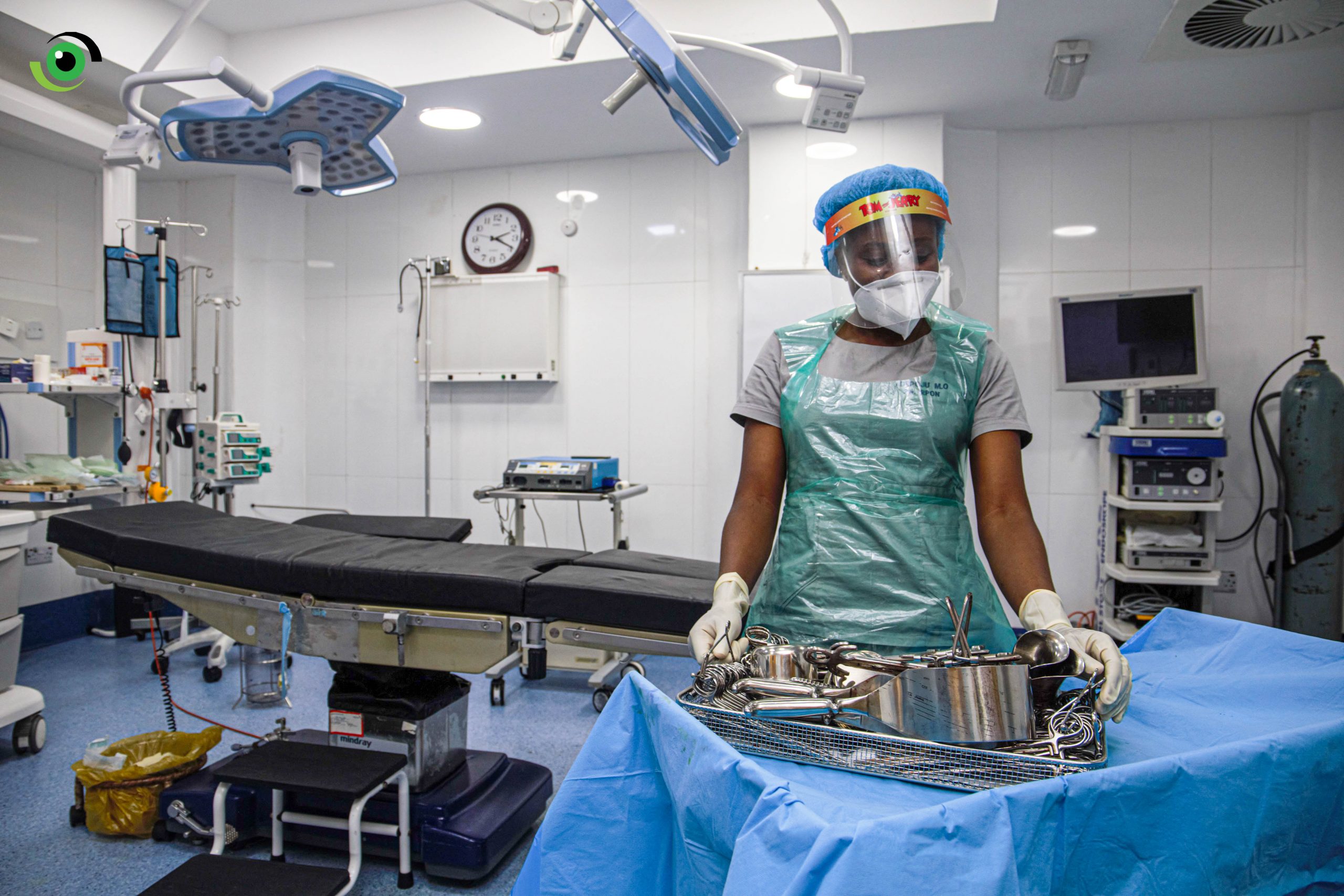By Chibuike Alagboso and Adaobi Ezeokoli (Lead Writers)
When Oluwaytoyin Adebiyi, a 66-year old elderly resident of Ejigbo in Lagos State woke up on April 28, 2020, he expected the day to start and end like any other day — he would spend the day at the stationery business he operates with his wife of nearly 40 years, Temilola Adebiyi, then an evening with his visiting grandkids, and a good night’s sleep. What happened instead was a first for him for as long as he can remember — an urgent trip to the hospital and a diagnosis of heart failure.
Cardiovascular diseases, commonly called heart diseases, are conditions that present with narrowed or blocked blood vessels that can lead to heart attacks, chest pains or strokes. They account for the most deaths resulting from non- communicable diseases (NCDs) globally, with 17.9 million deaths annually. Limited data exists on the burden of NCDs in Nigeria, but the National Multi-sectoral Action Plan for the Prevention and Control of Non-communicable Diseases (2019–2025), outlines steps that can help reduce deaths from NCDs. The World Health Organisation (WHO) also supports countries with NCD surveillance using the STEPwise survey.
For patients such as Mr Adebiyi, managing heart conditions often means sophisticated procedures such as open heart surgery. The first open heart surgery in Nigeria was in 1974 at the University of Nigeria Teaching Hospital (UNTH) Enugu. Heart surgery is a highly specialised procedure and a major contributor to medical tourism in Nigeria. Due to the COVID-19 pandemic and international travel bans, traveling outside Nigeria was prohibited. In addition, there were widespread reports that health facilities were rejecting patients for fear of admitting patients infected with the coronavirus. This meant that getting care at hospitals became difficult.
Gasping for air: A heart attack in an uncertain time
Mrs Adebiyi said her husband had been previously diagnosed with a heart condition sometime in 2018. He was advised on a diet to adhere to for his heart health. On the night of 28th April, 2020, after their evening prayers, he sent one of his grand daughters who came visiting to call his wife. As she came into the room he was gasping for air as he struggled to say “it’s coming again!”, referring to the episodes of passing out he recently started experiencing.
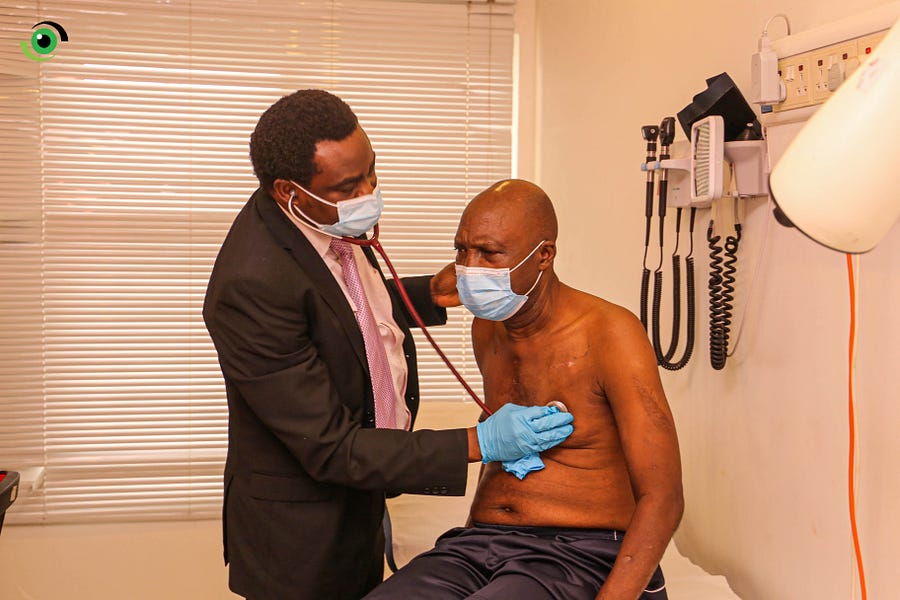
She said they placed several frantic calls to their children, family and friends. One of their sons recommended they head to Reddington Hospital. They headed to Victoria Island, where Reddington was located. By the time they arrived, it was past midnight and Mr Adebiyi had regained consciousness and was able to walk into the hospital by himself. It wasn’t long however before he lost consciousness again, but this time, he was in expert hands.
Preparation meets opportunity
The Adebiyis’ visit to Reddington Hospital to seek healthcare coincided with an important time in the hospital’s journey. The management of the hospital had just signed on a partnership with Tristate Healthcare System, a cardiac interventionist group led by US trained interventional cardiologist, Professor Kamar Tayo Adeleke. “The agreement was only two weeks old. We didn’t even have anything in place when the patient came in the middle of the night, around 1am,” Adeleke recalls.
The partnership was designed to bridge the gap in availability of quality cardiac and critical care services at Reddington. Similar partnerships have already proven successful at Babcock University Teaching Hospital (BUTH) in Ogun State and Afe Babalola Multi System Hospital in Ekiti State. Hundreds of successful complicated heart surgeries have already been performed by these hospitals, and staff capacity built.
Reddington Hospital started out as a cardiac centre before transitioning to a multi-specialist hospital with centres across Lagos State. Adeleke said they are well- run, had the right structures in place and and, in addition, having their COHASA accreditation made them an excellent partner. So for the partnership, Reddington provided the infrastructure while Tristate provided the cardiothoracic surgeons and other specialists. They also ensured skills transfer and training other support staff.
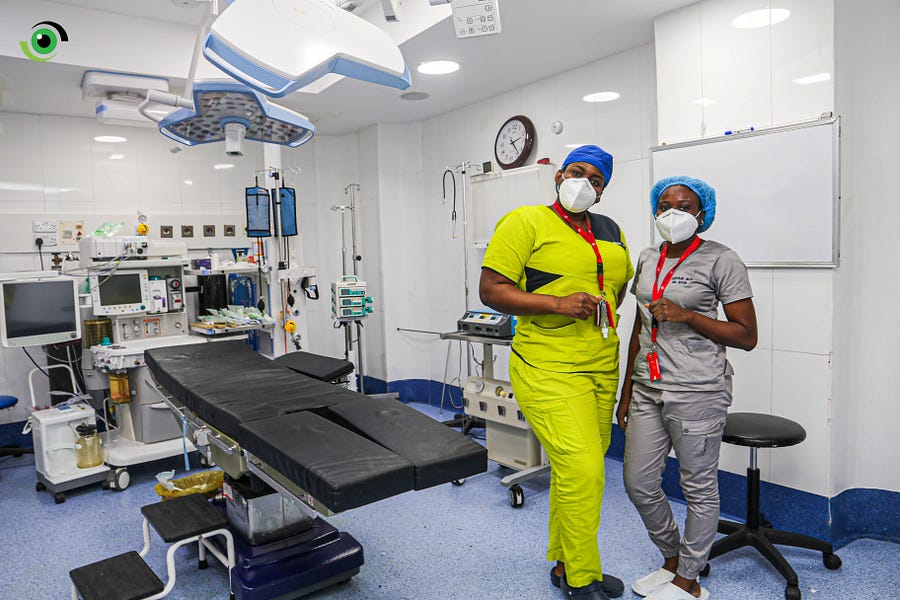
When the team of experts assessed Mr Adebiyi after he passed out in the hospital, they found that the function of the heart that keeps it pumping at regular intervals, was no longer working optimally. They put in a temporary pacemaker, but Professor Adeleke said he kept wondering why his heart was not functioning as it should have been. Further conversations with the patient revealed that his passing out episodes started a year earlier, after he exhausted the medication he was taking for chest pains and used a substitute. “I suspected the vessels in his heart were blocked after he said this. If we had placed him on a permanent pacemaker, he would have died from a massive heart attack because the root cause had not been addressed,” Adeleke said.
They performed a heart catheterisation but just before the procedure, Mr Adebiyi’s kidneys failed. Thankfully, Reddington Hospital has a high-performance dialysis machine and resuscitated him. “When we finally did the catheterisation, we found he had blockages everywhere. Three major arteries in the heart had 99% blockage,” Adeleke recounted. This meant only one thing, open-heart surgery. The dilemma became if they should send the patient to BUTH or race against time to put the remaining things in place and perform the surgery at the Reddington Hospital.
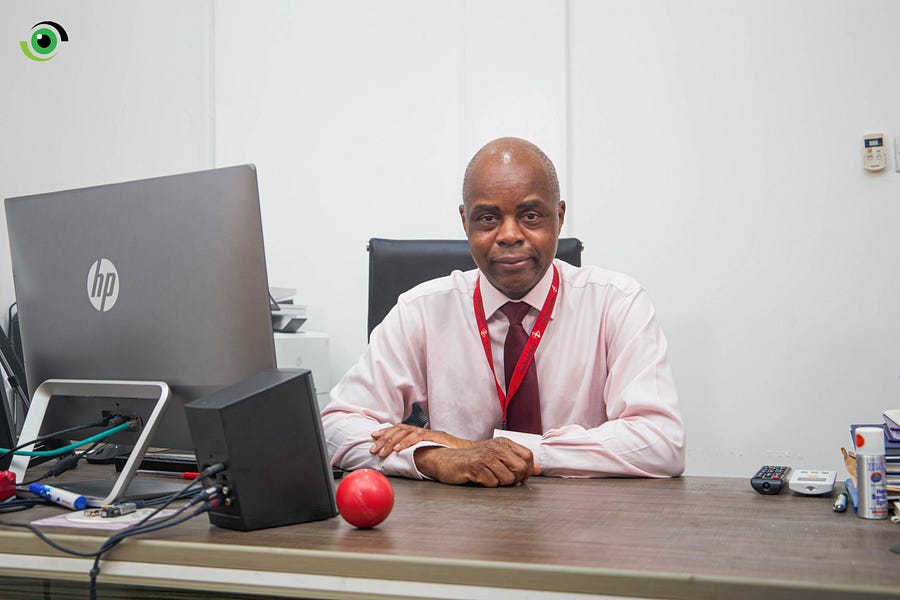
This was an important decision for the partnership, recalls Reddington’s Group Managing Director, Dr Olutunde Lalude. “Usually, when you are looking at starting a cardiac surgery program, you don’t start with the complex cases. You start with simple things, you get your team together, you get them to experience working together because you are looking at your results. You don’t want to start with complications where there might be problems, which then casts doubts in the quality of your service. However, the COVID pandemic proved an issue for patients. So we have a patient who comes in with a serious cardiac issue that needs to be sorted out with a surgery and is at serious risk of having a fatal heart attack if he is not operated on,” he said.
But they believed it was important to proceed to show that even in the midst of the COVID-19 pandemic, a critical case could still be done for the first time in a hospital, but importantly, they had the expertise in place. Also, developing internal Infection Prevention and Control (IPC) guidelines in the hospital meant that the hospital was ready when the case happened, says Dr Tokunbo Babajide, a safety specialist who leads the hospital’s infection prevention and control unit and COVID-19 preparedness.
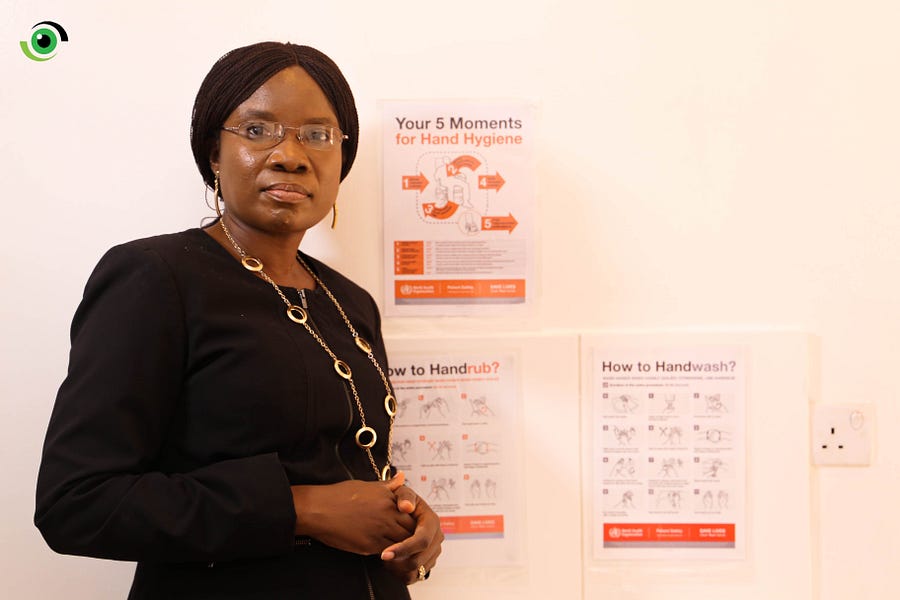
If you want to go far, go together
Dr Lalude said Reddington had all the equipment necessary for the surgery except one critical piece — a heart-lung machine. This machine was necessary as it temporarily takes over the functions of the heart and lungs during surgery by circulating blood and oxygen. The hospital already ordered theirs, he said, but delivery was being delayed as a result of the restricted international travels. Reddington reached out to Lagos State University Teaching Hospital (LASUTH) who graciously loaned their heart-lung machine for the surgery.
Tristate then had meetings with Dr. Lalude and Reddington’s senior management team. They agreed to proceed with the surgery, even though they knew the partnership would not be making any profit from this particular case. “This is an important mindset to have in these sorts of collaborations. You can’t go in with the sole intent to make profit. In Babcock, it took almost four years before we broke even. And this was just about 4 million after spending billions over the years,” Adeleke said.
The joint team had only three days to prepare for the surgery. Three days before the procedure, Adeleke convened a meeting with the team to discuss the surgery and to prepare a checklist. Electricity was a major concern as the heart-lung machine used to perform the cardiopulmonary bypass needed to remain connected to the electricity supply while the surgery was in progress. Dr Lalude said they addressed this issue by providing multiple layers of backup power — two generating sets and separate UPS systems to run the theatre and the machine.
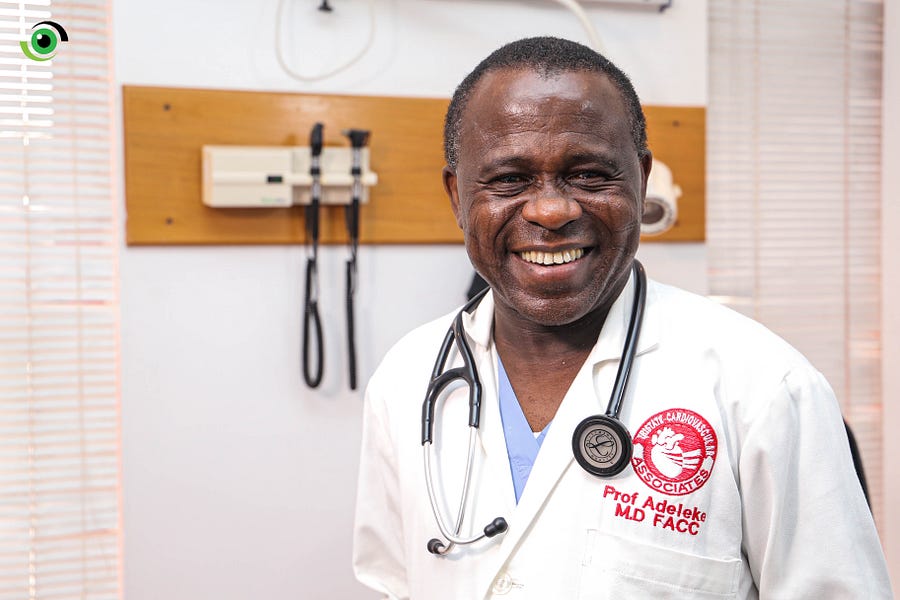
Two days before, they performed a dry run of the surgery. The multidisciplinary team comprised almost every unit in the hospital including procurement, laboratory, biomedical engineers and the surgical team. Preparation and planning were key to the surgery’s success, says Nkeiruka Maryann, Reddington Hospital’s Theatre Manager. “For me the key word here is safety. We need to be safe for our patients to be safe, so if I’m able to check everything needed off my list, I think I’m safe to go on with the surgery. That was where I started,” she said.
Seven hours of precision healthcare
Mr Adebiyi recalls the day of the surgery. “It’s a very big place with several equipment. People were moving around. They put socks on my two legs. After laying me down, I remember they called my daughter to come and see me. The man that did the anesthesia already informed me that he would be the last voice I hear before the surgery and the first voice I hear after. He asked me, ‘Your friends, what do they call you?’ I said, ‘My friends call me Toyin’. He said, ‘We are now friends, you will hear me call Toyin when you wake up.”
On the day of the surgery, the team successfully completed what Professor Adeleke described as a nerve-wracking, seven hours surgical procedure.
Maryann said it felt like their most important surgery. “It was like a two-in-one surgery and we needed him to survive and remain infection free. There were lots of personnel around and a lot of things going on but traffic control was my key thing because of the COVID-19 situation. I was very conscious because I was the circulating nurse, so I needed to make sure that we too were safe. So some people had to stay out and only come in when needed. I didn’t scrub so I made sure the surgeons and other personnel had all the things they needed,” she said.
Her colleague, Adepoju Okulola, a perioperative nurse scrubbed during the surgery. “I’ve been in major surgeries, but it was my first time in a cardiothoracic surgery. During the bypass, when the heart-lung machine took over, you could see the heart being pumped. That was the most exciting moment for me,” she recalls.
Mrs Adebiyi said once they received the news that the surgery was over and her husband survived, she rejoiced with her family.
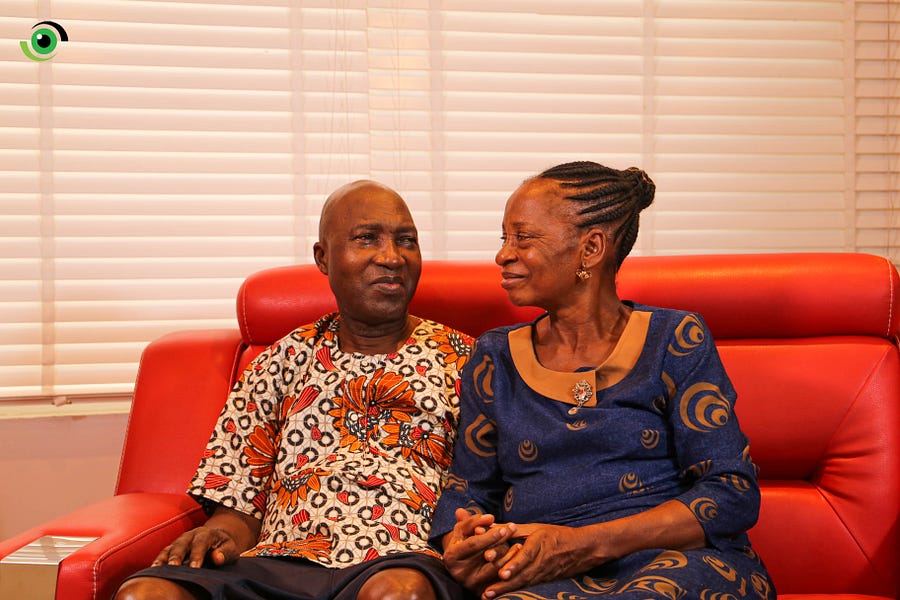
For Adeleke, successfully completing such a complex surgery in Nigeria was fulfilling. He said this was his dream in returning to Nigeria and setting up the cardiac practices and partnerships. He said leaving Nigeria to access healthcare should not be because people can’t access the care they need in Nigeria. The same vision drives Dr Lalude, who doubles as the Chief of Surgery at the hospital. “One of my missions here in Nigeria is to reverse medical tourism,” he said.
Building homegrown capacity for specialist healthcare delivery is possible
Nearly two months later, in June 2020, Mr Adebiyi walked into Reddington Hospital, hand-in-hand with his wife for his routine checkup. The hospital discharged him two weeks after the surgery. He said his biggest takeaway from this experience is that Nigerians should look within for healthcare, as some people die while waiting for visas to travel out of the country. “We should realise that facilities like Reddington have the equipment and personnel to handle these things perfectly. And even when you travel, you discover that most of these specialists are still Nigerians,” he said, adding “What I saw here was a group of people led by a good leader. A team of carefully selected professionals, from nurses, doctors and various specialists. I can’t remember all the people that came to speak with me. Even a dietician came to speak with me”.
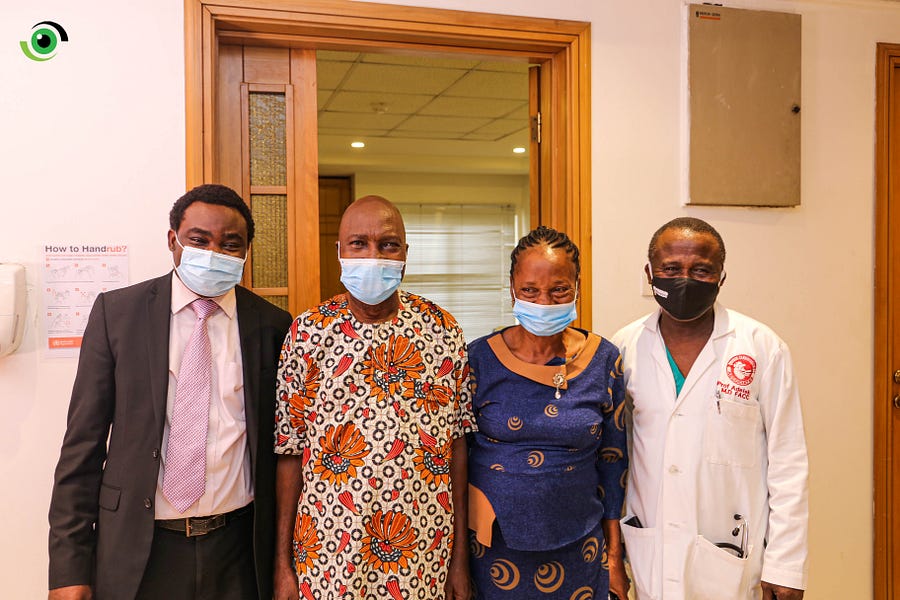
Professor Adeleke said he is proud of how far they have come with transferring specialist care skills to staff. This is another reason for establishing the partnerships — to help build local capacity to meet the demand for specialist care in Nigeria. He believes this is critical if Nigeria is to reverse the trend of medical tourism in Nigeria. He expressed pride in the team that performed the open heart surgery. “They were 100% Nigerian including the perfusionist who handled the heart-lung machine. This is a very sensitive and highly specialised process but all team members were local,” he said. When Tristate Health started developing partnerships, Adeleke said they had to bring in cardiothoracic surgeons to support and this reflected in the cost of care for the patient. Over time, the ratio has dropped to 40% expatriates and now they have all homegrown teams fully capable of performing open heart surgeries.
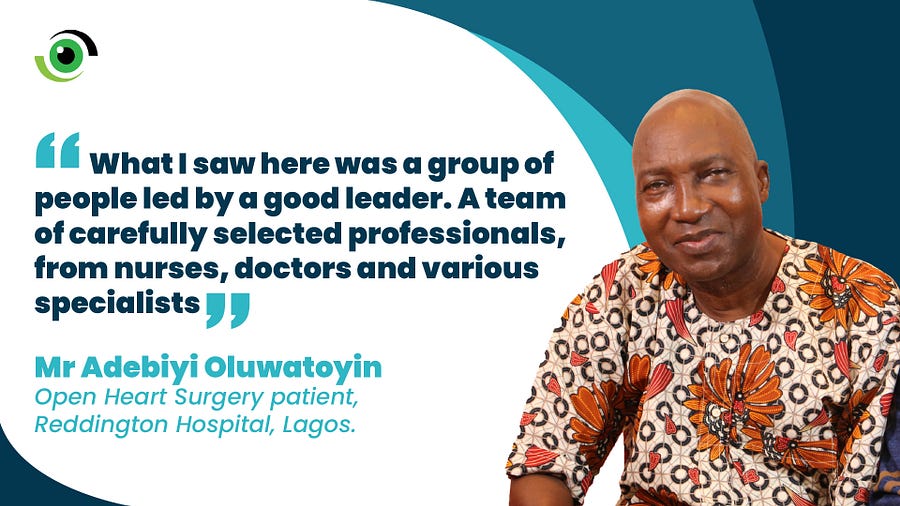
The cost of the surgery to the Adebiyi family is lower compared with what they would pay for similar surgery in places like the United Kingdom (UK) or the United States of America (USA), Adeleke said. “If I perform this surgery in the USA, it would cost between $75,000 — $100,000 but here we are talking between 4–5 million Naira. That’s roughly $10,000. So there is a difference,” he said. He added that another advantage of having such a procedure done in Nigeria is that the patient can receive treatment and recover with family and friends around them which is usually not possible if they travel out of the country for treatment.
But for patients to benefit even more, Dr.Lalude says health insurance is important because even at the subsidised cost of specialist care, some patients cannot afford to pay. Mr Adebiyi for instance, said he is paying out of pocket for the surgery. Most health insurance plans also do not cover complex surgeries or have a limit on what procedure they would cover.
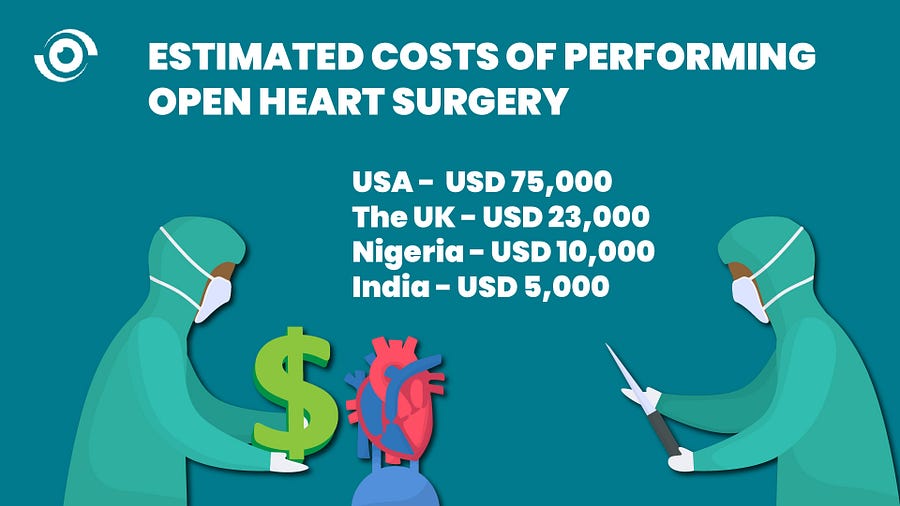
With successful surgeries such as Mr Adebiyis’, Prof Adeleke and Dr. Lalude hope Nigerians will have the confidence to seek specialist care right here in Nigeria, instead of travelling to other countries.
Excellence in complex healthcare is the future at Reddington
“The future is extremely bright. We are on a trajectory to provide increasingly complex healthcare,” says Dr Lalude. The partnership continues to be a work in progress and Lalude says they want to push cardiac care to its limit, including introducing paediatric cardiac services to correct congenital birth defects. “So there should be little, if any reason to travel abroad. The whole idea is that we provide the full gamut of cardiac services here in Nigeria,” he said.
But for collaborations such as Reddington’s and Tristate’s to continue, Professor Adeleke said lessons from earlier partnerships in Nigeria have taught him that understanding common goals and ensuring transparency is important.
It is also important for both parties to critically appraise their individual value propositions and how that helps the partnership. Finally, the government must live up to their responsibilities to citizens by constantly reviewing and updating policies to encourage private healthcare organisations who wish to import medical equipment to support their work. This way, more Nigerian lives, like Mr. Adebiyis’, will be saved because they are able to access critical care when it matters most. And like Mr Adebiyi, they will be satisfied enough to say the same thing he said about the care he received at Reddington Hospital; “They have the equipment and they are very competent, so if you are here, you are in safe hands.”
Do you know of other excellent specialist healthcare centres in Nigeria? Tell us about them! Leave a comment below or tag us on social media, @nighealthwatch on Twitter and @nigeriahealthwatch on Facebook and Instagram.


